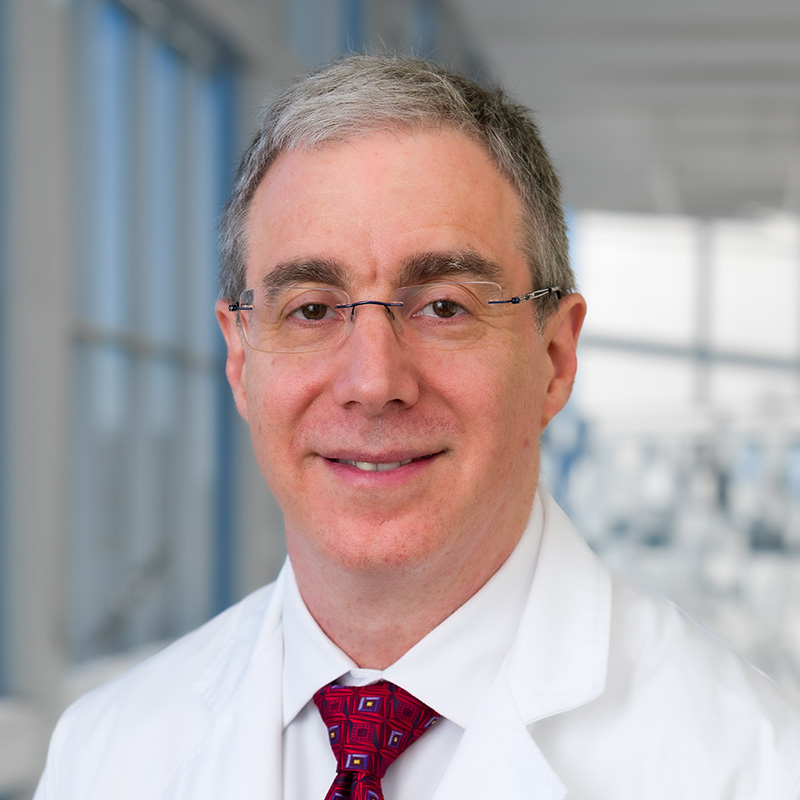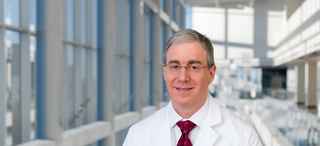- D Magazine Best Doctor 2020-2025

Scott Reznik, M.D.
- Cardiovascular and Thoracic Surgery
- Lung & Esophageal Cancer
- Pulmonary/Lung-Chest Wall-Mediastinal-Pleural Nodules
New Patient Appointment Accepting Virtual Visits or 214-645-7700
Biography
Scott Reznik, M.D., is a Professor in the Division of Thoracic Surgery in the Department of Cardiovascular and Thoracic Surgery at UT Southwestern.
After receiving his undergraduate degree in chemistry a Duke University, Dr. Reznik earned his medical degree from Washington University School of Medicine. He completed a residency in general surgery at Washington University/Barnes-Jewish Hospital, as well as a postdoctoral research fellowship in lung transplant immunology. He then received advanced training in thoracic and cardiovascular surgery at the Cleveland Clinic.
Prior to joining UT Southwestern in 2014, Dr. Reznik was the Chief of Thoracic Surgery at Scott and White Memorial Hospital and Clinic in Temple, Texas.
His clinical research interests include lung cancer, esophageal cancer, and minimally invasive surgical approaches for both. He has a special interest in patient safety and quality care that includes research on how to safely educate surgical trainees.
Dr. Reznik is certified by the American Board of Surgery and the American Board of Thoracic Surgery. He is a member of the General Thoracic Surgical Club, the American College of Surgeons, the Association for Academic Surgery, and the Society of Thoracic Surgeons.
Meet Dr. Reznik
Minimally Invasive Thoracic Surgeon
Minimally invasive thoracic surgeon Scott Reznik, M.D., focuses on surgical treatments for problems of the chest, including benign and malignant diseases of the lungs, esophagus, diaphragm, and mediastinum (the area between the lungs).
Dr. Reznik has honed his minimally invasive surgery skills with the goal of helping patients recover faster and return to their lives more quickly.
“Today’s minimally invasive technology allows us to do surgeries that are equivalent – and in some cases, superior – to open-incision surgeries,” he says. “When appropriate for the patient’s needs, it’s a great option.”
For some patients with thoracic disorders, Dr. Reznik offers robotic surgery, in which he uses the assistance of a robotic arm to access the chest cavity through tiny incisions and small instruments that he controls from a computer console.
When it comes to treatment decisions, Dr. Reznik lays out all the options for patients and their families and engages them in every step of their care. He empowers his patients to participate in decision-making so that their care plan is customized to fit their needs.
“It’s not one size fits all for every diagnosis,” he says. “There’s not one right answer for every patient. Working with my UT Southwestern colleagues, I help patients tailor a treatment plan that’s right for them.”
As a self-described “cautiously aggressive” surgeon, Dr. Reznik has been known to take on cases that other surgeons have refused, but only when it’s in the best interest of the patient. Those decisions take a lot of discussion and planning with patients and colleagues, he says, and no decision is made lightly.
“It’s always about what’s best for the patient,” he says.
Education & Training
- Fellowship - Cleveland Clinic Foundation (2002-2005), Cardiovascular & Thoracic Surgery
- Residency - Washington University/Barnes Jewish Hospital (1999-2002), General Surgery
- Research Fellowship - Washington University in St. Louis School of Medicine (1997-1999), Surgery
- Residency - Washington University/Barnes Jewish Hospital (1995-1997), General Surgery
- Medical School - Washington University School of Medicine (1991-1995)
Honors & Awards
Books & Publications
-
Publications
-
Gastric Cancer, Version 2.2025, NCCN Clinical Practice Guidelines In Oncology.
Ajani JA, D'Amico TA, Bentrem DJ, Corvera CU, Das P, Enzinger PC, Enzler T, Gerdes H, Gibson MK, Grierson P, Gupta G, Hofstetter WL, Ilson DH, Jalal S, Kim S, Kleinberg LR, Klempner S, Lacy J, Lee B, Licciardi F, Lloyd S, Ly QP, Matsukuma K, McNamara M, Merkow RP, Miller AM, Mukherjee S, Mulcahy MF, Perry KA, Pimiento JM, Reddi DM, Reznik S, Roses RE, Strong VE, Su S, Uboha N, Wainberg ZA, Willett CG, Woo Y, Yoon HH, McMillian NR, Stein M, Journal of the National Comprehensive Cancer Network : JNCCN 2025 May 23 5 169-191 -
The Current State of Tumor Microenvironment-Specific Therapies for Non-Small Cell Lung Cancer.
Chandra R, Ehab J, Hauptmann E, Gunturu NS, Karalis JD, Kent DO, Heid CA, Reznik SI, Sarkaria IS, Huang H, Brekken RA, Minna JD, Cancers 2025 May 17 11 -
CT Scans Understage Lymph Nodes in Gastric and Gastroesophageal Adenocarcinoma.
Pettigrew MF, Kumar P, Nahi SL, Reznik SI, Hammer STG, Porembka MR, Wang SC, Journal of surgical oncology 2025 Mar -
Correction to: Lenvatinib inhibits the growth of gastric cancer patient‑derived xenografts generated from a heterogeneous populations.
Karalis JD, Yoon LY, Hammer STG, Hong C, Zhu M, Nassour I, Ju MR, Xiao S, Castro-Dubon EC, Agrawal D, Suarez J, Reznik SI, Mansour JC, Polanco PM, Yopp AC, Zeh Iii HJ, Hwang TH, Zhu H, Porembka MR, Wang SC, Journal of translational medicine 2024 Sep 22 1 842 -
Clinical and radiological septic joint analysis of spontaneous sternoclavicular joint infections: Achieving the best Outcomes- A systems engineering approach.
Pothini T, Wilmot CD, Waters JK, Wait MA, Reznik SI, Jordan KG, Caire JT, Ashworth JM, Cady LC, Lysikowski JR, Yen CF, Weinschenk RC, Samade R, Jessen ME, Kusiak A, Kernstine KH, European journal of cardio-thoracic surgery : official journal of the European Association for Cardio-thoracic Surgery 2024 Mar -
Circumferential tracheal replacement with silicone stent supported, cryopreserved aortic homograft.
Hauptmann E, Dhar S, Harirah O, Chandra R, Reznik S, Waters J, Journal of surgical case reports 2024 Feb 2024 2 rjae040 -
Defining Volume Targets for Regionalization of Pancreaticoduodenectomy, Esophagectomy, and Major Lung Resection Centers to Improve Oncologic and Surgical Outcomes.
Ju MR, Karalis JD, Leonard G, Mansour JC, Karagkounis G, Wang SC, Reznik SI, Porembka MR, Annals of surgical oncology 2023 Sep -
To radiate or not to radiate: that is the question?-a commentary on "Neoadjuvant chemoradiotherapy versus neoadjuvant chemotherapy followed by minimally invasive esophagectomy for locally advanced esophageal squamous cell carcinoma: a prospective multicenter randomized clinical trial".
Chandra R, Reznik SI, Chinese clinical oncology 2023 Sep -
Life-threatening hemoptysis in patients with metastatic kidney cancer.
Patel VM, Elias R, Asokan A, Sharma A, Christie A, Pedrosa I, Chiu H, Reznik S, Hannan R, Timmerman R, Brugarolas J, Clinical genitourinary cancer 2023 Aug 21 4 497-506 -
Serum Interleukin 6 Level is Associated With Overall Survival and Treatment Response in Gastric and Gastroesophageal Junction Cancer.
Karalis JD, Ju MR, Yoon LY, Castro-Dubon EC, Reznik SI, Hammer STG, Porembka MR, Wang SC, Annals of surgery 2023 Jul -
An Order of Ice to Go.
Clark R, Reznik SI, The Annals of thoracic surgery 2023 Jun -
Esophageal and Esophagogastric Junction Cancers, Version 2.2023, NCCN Clinical Practice Guidelines in Oncology.
Ajani JA, D'Amico TA, Bentrem DJ, Cooke D, Corvera C, Das P, Enzinger PC, Enzler T, Farjah F, Gerdes H, Gibson M, Grierson P, Hofstetter WL, Ilson DH, Jalal S, Keswani RN, Kim S, Kleinberg LR, Klempner S, Lacy J, Licciardi F, Ly QP, Matkowskyj KA, McNamara M, Miller A, Mukherjee S, Mulcahy MF, Outlaw D, Perry KA, Pimiento J, Poultsides GA, Reznik S, Roses RE, Strong VE, Su S, Wang HL, Wiesner G, Willett CG, Yakoub D, Yoon H, McMillian NR, Pluchino LA, Journal of the National Comprehensive Cancer Network : JNCCN 2023 Apr 21 4 393-422 -
"Mega" Cisterna Chyli: A Case Report and Review of the Literature.
Chandra R, Murphy T, Jordan KG, Waters JK, Reznik SI, Cureus 2023 Jan 15 1 e34111 -
Vacutainers and Primers Over X-Rays and Gamma Rays: The Role of Circulating Tumor DNA in Esophageal Adenocarcinoma Staging and Surveillance: Invited Commentary on "Potential Clinical Utility of a Targeted Circulating Tumor DNA Assay in Esophageal Adenocarcinoma".
Chandra R, Reznik SI, Annals of surgery 2022 Aug 276 2 e127-e128 -
Training Cardiothoracic Residents in Robotic Lobectomy Is Cost-Effective With No Change in Clinical Outcomes.
Nawalaniec JT, Elson M, Reznik SI, Wait MA, Peltz M, Jessen ME, Madrigales A, Lysikowski J, Kernstine KH, Innovations (Philadelphia, Pa.) 2022 Mar 15569845221086278 -
Update on Management of Squamous Cell Esophageal Cancer.
Waters JK, Reznik SI, Current oncology reports 2022 Mar 24 3 375-385 -
Lenvatinib inhibits the growth of gastric cancer patient-derived xenografts generated from a heterogeneous population.
Karalis JD, Yoon LY, Hammer STG, Hong C, Zhu M, Nassour I, Ju MR, Xiao S, Castro-Dubon EC, Agrawal D, Suarez J, Reznik SI, Mansour JC, Polanco PM, Yopp AC, Zeh HJ, Hwang TH, Zhu H, Porembka MR, Wang SC, Journal of translational medicine 2022 03 20 1 116 -
Gastric Cancer, Version 2.2022, NCCN Clinical Practice Guidelines in Oncology.
Ajani JA, D'Amico TA, Bentrem DJ, Chao J, Cooke D, Corvera C, Das P, Enzinger PC, Enzler T, Fanta P, Farjah F, Gerdes H, Gibson MK, Hochwald S, Hofstetter WL, Ilson DH, Keswani RN, Kim S, Kleinberg LR, Klempner SJ, Lacy J, Ly QP, Matkowskyj KA, McNamara M, Mulcahy MF, Outlaw D, Park H, Perry KA, Pimiento J, Poultsides GA, Reznik S, Roses RE, Strong VE, Su S, Wang HL, Wiesner G, Willett CG, Yakoub D, Yoon H, McMillian N, Pluchino LA, Journal of the National Comprehensive Cancer Network : JNCCN 2022 02 20 2 167-192 -
The Colorectal Cancer Tumor Microenvironment and Its Impact on Liver and Lung Metastasis.
Chandra R, Karalis JD, Liu C, Murimwa GZ, Voth Park J, Heid CA, Reznik SI, Huang E, Minna JD, Brekken RA, Cancers 2021 Dec 13 24 -
Minimally invasive thymectomy for myasthenia gravis favours left-sided approach and low severity class.
Wilshire CL, Blitz SL, Fuller CC, Rückert JC, Li F, Cerfolio RJ, Ghanim AF, Onaitis MW, Sarkaria IS, Wigle DA, Joshi V, Reznik S, Bograd AJ, Vallières E, Louie BE, European journal of cardio-thoracic surgery : official journal of the European Association for Cardio-thoracic Surgery 2021 Oct 60 4 898-905 -
Multi-Institutional Evaluation of a Debate-Style Journal Club for Cardiothoracic Surgery Trainees.
Luc JGY, Fowler CS, Eisenberg SB, Estrera AL, Wolf RK, Choi CW, Lawton JS, Martin LW, Nesbitt JC, Reznik SI, Nguyen TC, Vaporciyan AA, Antonoff MB, The Annals of thoracic surgery 2021 Sep -
Commentary: Leave the Knife and Take the Needle and a Cytopathologist.
Reznik SI, Seminars in thoracic and cardiovascular surgery 2021 Jul -
Commentary: Can we embrace our bias and move beyond it?
Reznik SI, The Journal of thoracic and cardiovascular surgery 2021 07 162 1 272-273 -
The changing face of gastric cancer: epidemiologic trends and advances in novel therapies.
Chandra R, Balachandar N, Wang S, Reznik S, Zeh H, Porembka M, Cancer gene therapy 2021 May 28 5 390-399 -
Commentary: Doc, What Do You Think?
Reznik SI, Seminars in thoracic and cardiovascular surgery 2021 Mar -
Hispanic/Latino Patients with Gastric Adenocarcinoma Have Distinct Molecular Profiles Including a High Rate of Germline CDH1 Variants.
Wang SC, Yeu Y, Hammer STG, Xiao S, Zhu M, Hong C, Clemenceau JR, Yoon LY, Nassour I, Shen J, Agarwal D, Reznik SI, Mansour JC, Yopp AC, Zhu H, Hwang TH, Porembka MR, Cancer research 2020 06 80 11 2114-2124 -
Commentary: Fear not the rise of the machines.
Reznik SI, The Journal of thoracic and cardiovascular surgery 2020 Jun -
Commentary: Make surgery great again.
Reznik SI, The Journal of thoracic and cardiovascular surgery 2020 Feb -
Commentary: Finally, data to support dogma.
Reznik SI, The Journal of thoracic and cardiovascular surgery 2019 08 158 2 568-569 -
Post-thoracotomy pain and nerve protection: Back to the drawing board?
Reznik SI The Journal of thoracic and cardiovascular surgery 2019 Jan 157 1 376-377 -
The incidence and treatment of a symptomatic diaphragmatic hernia following esophagectomy for cancer (Commentary).
Reznik SI The Annals of thoracic surgery 2018 Apr -
Adjuvant Chemotherapy vs Postoperative Observation Following Preoperative Chemoradiotherapy and Resection in Gastroesophageal Cancer: A Propensity Score-Matched Analysis.
Mokdad AA, Yopp AC, Polanco PM, Mansour JC, Reznik SI, Heitjan DF, Choti MA, Minter RR, Wang SC, Porembka MR JAMA oncology 2017 Sep -
Coxiella burnetti-associated thoracic endovascular stent graft infection.
Clarke NS, Reznik SI, Jessen ME, Murthy R Journal of cardiac surgery 2017 Jun -
From tennis balls to pearls: Bridging the communication gap to surgical trainees.
Reznik SI The Journal of thoracic and cardiovascular surgery 2017 May -
Association between diabetes and esophageal cancer, independent of obesity, in the United States Veterans Affairs population.
Dixon JL, Copeland LA, Zeber JE, MacCarthy AA, Reznik SI, Smythe WR, Rascoe PA Diseases of the esophagus : official journal of the International Society for Diseases of the Esophagus / I.S.D.E 2015 Oct -
Methicillin-Resistant Staphylococcus aureus Colonization and Empyema. Does it Matter?
Dixon JL, Papaconstantinou HT, Pruszynski J, Rascoe PA, Reznik SI Surgical infections 2015 Sep -
Redundancy and variability in quality and outcome reporting for cardiac and thoracic surgery.
Dixon JL, Papaconstantinou HT, Hodges B, Korsmo RS, Jupiter D, Shake J, Sareyyupoglu B, Rascoe PA, Reznik SI Proceedings (Baylor University. Medical Center) 2015 Jan 28 1 14-7 -
Surgical safety checklist and operating room efficiency: results from a large multispecialty tertiary care hospital.
Papaconstantinou HT, Smythe WR, Reznik SI, Sibbitt S, Wehbe-Janek H American journal of surgery 2013 Dec 206 6 853-9; discussion 859-60 -
Thymic neuroendocrine carcinoma producing ectopic adrenocorticotropic hormone and Cushing's syndrome.
Dixon JL, Borgaonkar SP, Patel AK, Reznik SI, Smythe WR, Rascoe PA The Annals of thoracic surgery 2013 Oct 96 4 e81-3 -
Implementation of a surgical safety checklist: impact on surgical team perspectives.
Papaconstantinou HT, Jo C, Reznik SI, Smythe WR, Wehbe-Janek H The Ochsner journal 2013 13 3 299-309 -
Benign emptying of the postpneumonectomy space.
Merritt RE, Reznik SI, DaSilva MC, Sugarbaker DJ, Whyte RI, Donahue DM, Hoang CD, Smythe WR, Shrager JB The Annals of thoracic surgery 2011 Sep 92 3 1076-81; discussion 1081-2 -
Chondrosarcoma of the thorax.
Rascoe PA, Reznik SI, Smythe WR Sarcoma 2011 2011 342879 -
Winning the battle, losing the war: the noncurative "curative" resection for stage I adenocarcinoma of the lung.
Murthy SC, Reznik SI, Ogwudu UC, Farver CF, Arrossi A, Batizy LH, Nowicki ER, Mekhail TM, Mason DP, Rice TW, Blackstone EH The Annals of thoracic surgery 2010 Oct 90 4 1067-74 -
Myenteric plexus abnormalities associated with epiphrenic diverticula.
Rice TW, Goldblum JR, Yearsley MM, Shay SS, Reznik SI, Murthy SC, Mason DP, Blackstone EH European journal of cardio-thoracic surgery : official journal of the European Association for Cardio-thoracic Surgery 2009 Jan 35 1 22-7; discussion 27 -
Optimal exposure of thoracic inlet vascular structures: transmanubrial approach.
Smythe WR, Reznik SI Seminars in vascular surgery 2008 Mar 21 1 21-4 -
Assessment of a pathophysiology-directed treatment for symptomatic epiphrenic diverticulum.
Reznik SI, Rice TW, Murthy SC, Mason DP, Apperson-Hansen C, Blackstone EH Diseases of the esophagus : official journal of the International Society for Diseases of the Esophagus / I.S.D.E 2007 20 4 320-7 -
Indirect allorecognition of mismatched donor HLA class II peptides in lung transplant recipients with bronchiolitis obliterans syndrome.
Reznik SI, Jaramillo A, SivaSai KS, Womer KL, Sayegh MH, Trulock EP, Patterson GA, Mohanakumar T American journal of transplantation : official journal of the American Society of Transplantation and the American Society of Transplant Surgeons 2001 Sep 1 3 228-35 -
Activation of human airway epithelial cells by non-HLA antibodies developed after lung transplantation: a potential etiological factor for bronchiolitis obliterans syndrome.
Jaramillo A, Naziruddin B, Zhang L, Reznik SI, Smith MA, Aloush AA, Trulock EP, Patterson GA, Mohanakumar T Transplantation 2001 Apr 71 7 966-76 -
Anti-HLA antibody binding to hla class I molecules induces proliferation of airway epithelial cells: a potential mechanism for bronchiolitis obliterans syndrome.
Reznik SI, Jaramillo A, Zhang L, Patterson GA, Cooper JD, Mohanakumar T The Journal of thoracic and cardiovascular surgery 2000 Jan 119 1 39-45 -
Antibody to transforming growth factor beta reduces collagen production in injured peripheral nerve.
Nath RK, Kwon B, Mackinnon SE, Jensen JN, Reznik S, Boutros S, Plastic and reconstructive surgery 1998 Sep 102 4 1100-6; discussion 1107-8
-
Gastric Cancer, Version 2.2025, NCCN Clinical Practice Guidelines In Oncology.
Clinical Focus
- Lung & Esophageal Cancer
- Pulmonary/Lung-Chest Wall-Mediastinal-Pleural Nodules
- Esophageal Perforation
- Hiatal Hernia
- Tracheal and Bronchial Tumors
- Pleural and Pericardial Effusions
- Chest Wall Deformity
- Axillary Hyperhidrosis
Q&A by Dr. Reznik
Results: 1 Locations
Cardiovascular Thoracic Surgery Clinic
at Cancer Care Outpatient Building 6202 Harry Hines Blvd., 9th FloorDallas, Texas 75235 (214) 645-4673 Directions to Cardiovascular Thoracic Surgery Clinic at Cancer Care Outpatient Building, Dallas Parking Info for Cardiovascular Thoracic Surgery Clinic
New Patient Appointment Accepting Virtual Visits or 214-645-7700

